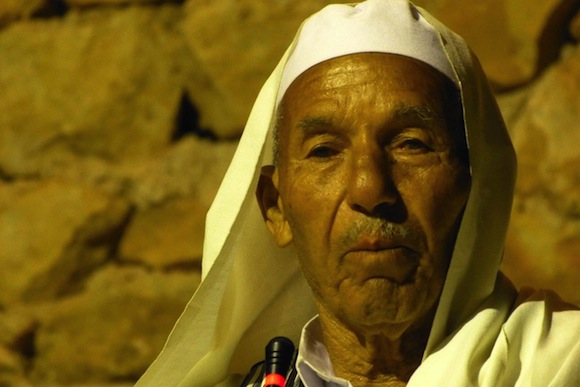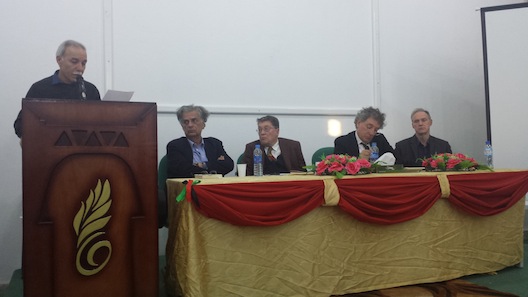By Rubens Piovano, Director of the Italian Cultural Institute, Tripoli.

Tripoli, 28 March 2014:
“The people will be really . . .[restrict]free only when they put down the weapons from their hands and replace them with words”.
These words, spoken by Spanish poet Juan Carlos Mestre before reading one of his own poems at the Old British Consulate in Tripoli Old Town on Wednesday could be seen as encapsulating the ideas behind the international gathering “Poems and Cities” which started on March 22, and then was taken in a four-day tour around the west of Libya.
Drawn together by dynamic Libyan poet Ashur Etwebi, president of the Arknu Society for Arts and Literature, poets from USA, Spain, Italy and Greece accepted the challenge of coming to Libya to meet and talk with local Arabs and Amazigh poets in a tour of poetry readings deep inside the country.
Organized by Abougela Hassan Alakrmi, president of Jilani Tribshan Cultural Forum of Rujban, who granted the protection during the entire trip, the poetry caravan stopped first in Wefat (Jadu), where all the local authorities, dressed in traditional costumes, welcomed the artists against the backdrop of the old village ruins.
“It was a real surprise for me to find out that in such small places there are still so many people keen and eager about poetry, and perfectly capable of interpreting their poems with passion and reading them from memory,” said Luigi Ballerini, a former professor of Italian Literature at UCLA in Los Angeles and a renowned poet himself. He shared the stage with all the foreign and local poets.
Following an ancient route of camel caravans along the desert, the poets stopped at a water well in the middle of a fascinating and impressive nowhere to discuss – animatedly –about poetry festivals and strategies to foster the growth of this special form of art in Libya.

Anastassis Vistonitis, Luigi Ballerini, Juan Carlos Mestre, Tom Sleigh (Photo: Italian Cultural Institute)
The discussion was led by Marie-Therese Valles-Bled, who has organised several poetry festivals and meetings in Europe, and by the Greek poet Anastassis Vistonitis, one of the organizers of the Athens World Poetry Festival. The Libyan authors exchanged ideas with all the invitees about ideas such as creating a poets’ circle, promoting poetry events and organisational know-how, fundraising, the selection of participants and relationships with local cultural authorities.
Then there were readings at the Qa’at Ashuhada in Ghadames, the local cultural centre, where Arab women’s voices were also heard along with the works of Musa Hream, the Deputy Minister of Culture of Libya, and Salah Engab, both representatives of the Amazigh poetry. The Arabic translation of the poems presented in different languages was read with a very deep and very professional voice throughout the tour by Libya’s ambassador in Spain, Mohammed Alfaqeeh Saleh.
After a moving stop at the Cultural Center of Nalut, where the sacrifices of the heroes of the revolution were commemorated, several local poets joined their passionate recitations to those of prize-winner Tom Sleigh from Brooklyn, New York, and to the elegant but sharp words of painter, musician and poet Mestre. There was also innovative and stimulating use of language by Luigi Ballerini and the powerful presence of Anastassis Vistonitis who, after reciting poems, read the first ten lines of the Homer’s Odyssey in three different versions – prose, metric and full poetry with pauses.
Libya is mentioned in the epic poem as a rich land where the lambs had horns as soon as they were born, where sheep gave three times a year and no shepherd ever went short of milk, meat or cheese. It was the land of the “Lotus-eaters”.
The tour was organised by the Italian Cultural Institute with the financial support of the European Union as part of the series “Libya meets Europe”. It again showed Libyans’ eagerness for culture after 42 year of isolation under the previous regime.
EU funding in this field is aimed at providing Libyans of all generations with the chance to link up their own thoughts and ideas with cultural stimuli from abroad and in doing so strengthen their own roots and cultural identity.
The packed house of the Old British Consulate on Wednesday, attended by the Italian and the British ambassadors and EU representatives, made a successful and joyous conclusion for this brave adventure which somehow made a little bit of history, having brought poets with very strong personalities from all over the world to the interior places of the new Libya. It demonstrated that poetry is always an essential tool to open minds and express freedom.
[/restrict]










